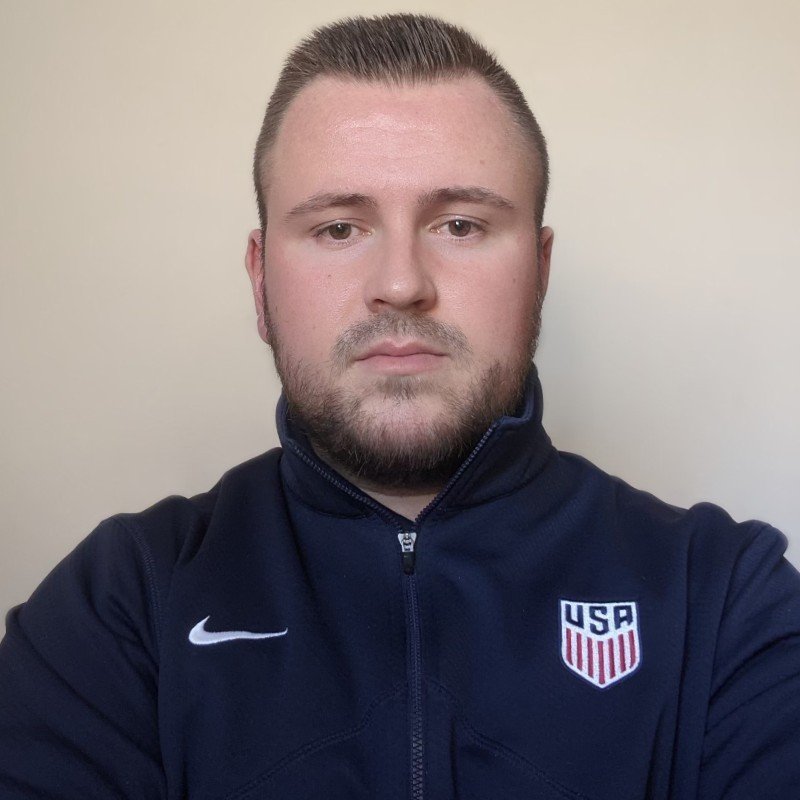
Walter Clapton
Executive Director at South Carolina Youth Soccer and Coach Educator with U.S. Soccer Federation
Walter has been coaching since the age of 16 and relocated to the United States at 18 to further his development. During his time, he played under one of his most influential coaching mentors, Brad Wellmen, who served as the Assistant 1st Team Coach at Canvey Island FC while Walter played on the Reserve Team.
In addition to his extensive coaching experience across the US with Century Soccer Club, BC United, Youth Elite Soccer, and Riverside High School, Walter has acquired several coaching qualifications. These include a Director of Coaching License, National A License, and completion of all FA Youth Award Modules (1-3).
How would you define a parent’s role within the youth sports environment?
Chauffeur, cheerleader, motivator, supporter, listener, coach, the list could go on!
In my personal opinion I think that a parent who can guide and promote fun and development for their child, especially during the pre-teen years, set their children up for a successful time in and out of sport.
This could be interpreted in many ways, but for me it is about:
Provide opportunities and environments to play.
Use their gauge/opinion of fun and development as performance indicators.
Promote them being inquisitive for things they can’t do or want to do.
Guide and praise them when good core values are demonstrated such as, effort levels, teamwork, respect for teammates & coaches, problem solving ability, to list a few
What are the benefits of being a positive youth sports parent?
Being a positive youth sports parent is going to ultimately increase your child’s positive experience in sport. We all want it to be a place they can go to enjoy the many benefits a healthy active lifestyle promotes, along with the skills associated with being part of a team.
Being positive is hopefully going to allow a parent and child to share a good relationship and experience when participating in sport. Aiding in their enjoyment and desire to participate and be with their parent(s).
What advice would you give youth sports parents for the car journey to and from youth sports practices and/or games?
Did you have fun? What did you work on/learn tonight? What do you want to do better next time? What did you do well at?
But also know when they may not want to talk, they may just need time to relax and digest what has happened. It doesn’t always need to be a quiz when they get in the car.
Tell us how your parents supported you in becoming a player/coach/teacher?
During the ages of 5 to 10, my parents were quite ‘hands off’. I didn’t play for a team, I just trained weekly and played in the garden with my older brother and younger brother. I didn’t have any pressure from them during those years and was just allowed to enjoy training once a week, playing with my siblings and playing in the school playground.
Although the term ‘hands off’ doesn’t seem like support, I think it allowed me to develop my own love for the game, without bias or influence from my parents pushing me into a sport or telling me what I should and shouldn’t love about it.
As I got older, my brother introduced me to coaching at our local youth club and from there the club pushed me into my Level 1 and Level 2. My mum drove me to and from licenses and sessions before I could drive and always just said how great it was that I was earning money to pay for my own football boots!
What advice would you give any youth sports parents, with a talented son/daughter and ambition also drive to reach the highest level?
Advice to the player
Depending on the age I think the advice changes but if we look at the U13+, and you want to reach the top level, there are sacrifices that you will need to make as a player. It is no surprise that players at the top played day and night, everywhere they could. They worked harder in all aspects of their sports life to ensure they worked harder than the people in their circles.
You may not be out partying like your friends and you may be spending holiday weekends training or playing, but that is the ‘nature of the beast’ when less than 1% make it pro. You have to be better than 99%.
Advice to the parents
Support and nourish the drive and ambition they have, but also understand the importance of academics and a ‘plan b’ in case they don’t make it. With geography in the US, it is not uncommon for parents to drive 2-3 hours one way to an MLS Academy while the player does homework in the car. To create an environment and platform for them to succeed might not be easy and it is going to change how you operate as a family, so be prepared for those changes to make them as positive and low impact on the family as possible.
What types of behaviours/mannerisms/comments would you encourage parents to demonstrate? Pre-During and Post training/match.
Just be positive. Don’t demonstrate negativity or fuel anger with your player. In my opinion it doesn’t teach them how to solve problems or handle stress. It just creates problems and adds to stress. Talk about the good things than happened during the last game and this game. Maybe great shots they had, tackles they won, passes they made.
Try not to engage in behaviour that makes the player angry, or give negative opinion on the game/coach/teammates. Allow and promote your child to discuss issues with the coach so that you can keep your relationship with your child one that is positive in the sport space.
In your experience as a coach, how can uneducated and unsupportive parents, effect player(s) (short & long term)?
Short Term – Players may lack confidence, lack enjoyment, lack confidence. And could just leave the sport. That is the ugly truth, that parents may drive their own kids to quitting sport. Parents who might not understand the sport or how the Club is looking to develop players could lead to conflict and unrest, making it an awkward environment for the child until they don’t feel welcome anymore. Without support, the player could feel like they have no worth leading to low self-esteem, especially when comparing themselves to their peers experiences.
Long Term – The worst effect in my opinion is leaving sport all together, and not being able to enjoy something that promotes a healthy active lifestyle in something that brings all types of people together.
If a player doesn’t leave the sport, then hopefully they didn’t adopt the unsupportive values that they were presented with during their youth sports career. As the behaviours that may be exhibited in negative, uneducated and unsupportive parents are not something we want to be passing along!
What advice would you give coaches/clubs regarding youth sports parents?
Tell them what you are doing, do it, and then tell them what you did.
Do not leave anything for interpretation. Some parents love to speculate, create drama, and cause a scene. So do not put yourselves in a situation where they can do those things.
Help educate them in how you do things and why, have parent meetings to discuss the expectations you have of yourself, players and parents.
Also, have a parent code of conduct!
Thank you to Walter for taking the time to complete the following interview questions.
LinkedIn: Walter Clapton









